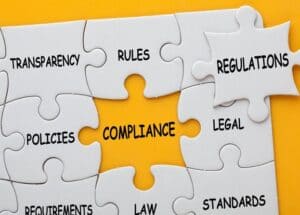There are certain legal requirements associated with becoming a landlord. Part of your due diligence is to investigate what sort of regulations and guidelines you will need to abide by. While legal requirements vary state to state (and sometimes county to county and city to city), there are a few general requirements and processes that you should be aware of in your rental property journey. See the list below.
- Establishing an LLC. With the help of a local attorney, you need to set up an LLC. Your attorney can help you navigate the legal implications of this process, but I would say it’s the first thing you need to do. Then, I would recommend putting your rental property in your LLC. Remember, it’s key to keep your business and personal accounts completely separate, so as to give you the maximum amount of protection that the corporation (LLC) can afford you. This will mean the LLC needs its own bank accounts to pay bills from.
- Obtaining a business license. Wherever you plan to do business, you’ll need to call the city’s office and speak with whoever issues business licenses. Most of the time, this is a very simple process. Typically, a business license will be less than $100.
- Working with government agencies (optional). There are several government agencies (i.e., housing authorities) that work with low-income families or individuals that can help you find tenants. However, there are usually some inspection requirements and paperwork that go along with renting to their clients. The positive thing about this is that rents are more or less insured to be paid by the local housing authority, but you do lose some control because you’re dealing with an agency as an intermediary. If you decide to work with government agencies or other housing authorities, there will be another layer of legal requirements and paperwork that you will need to be prepared for. From my experience, I think government agencies are pretty reasonable to work with, especially if you are proactive in completing paperwork and asking good questions.
As you navigate the processes and requirements listed above, there are a few pieces of advice that I’ll leave you with:
- Ask good questions. When you contact the city you plan to do business in, have some questions prepared. Ask them what it takes to do business and own rental property in their city. Ask them what they desire in their community’s business partners. Some cities require rental properties to have a property manager named and their phone number recorded so that they’re accessible in case of an emergency. It might be beneficial to ask your local official if they have such a system and how they would get in touch with you as a property manager if needed.
- Use your resources. The attorney who helps you with your LLC documents is a great resource to help you navigate other legal regulations. Be sure to ask him or her if there are additional legal filings that you need to be aware of. Additionally, whoever you use as a CPA is another resource to help you understand some of your company’s legal regulations.
- Wherever you choose to do business, consult with a local attorney. If you happen to do business in an area that is less familiar to you, be sure to find a local attorney who knows the area and can help you understand the relevant legal requirements. Most of the time, an attorney won’t charge you for one consultation, but even if you have to pay for a couple hours of their time, it will be well worth it to avoid any legal stumbling blocks.
- Be proactive. If you are proactive in seeking out legal requirements, resources, and permissions, you may be surprised by the connections you make and the network you build. There have been times when I’ve met with the city for legal reasons and have left with tenant referrals. Just remember that city officials are people too, and they have a job to do. Many people have negative attitudes in dealing with city officials, but I’ve found that city officials can be some of your strongest advocates, so remember to be courteous and professional with them.
In Summary:
- Be diligent in seeking out what is legally required of you. In any case, you will need to establish an LLC and obtain a business license.
- Ask good questions, use your resources, consult with a local attorney, and be proactive when fulfilling your legal duties. It’s better to be thorough in the front end than pay for legal oversights and mistakes later.

